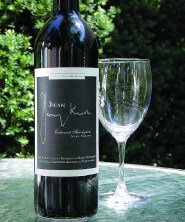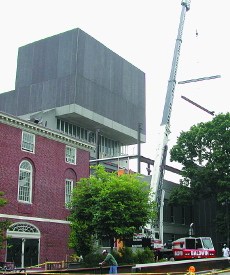Spirits of the Law
Since January 1999, when then-provost Harvey V. Fineberg promulgated it, Harvard's policy has been to prohibit "the use of Harvard's name or related images in labeling alcoholic beverages," including those occasions "when the beverage is to be served at a Harvard function or distributed as a gift." (The policy appears on Provost Steven E. Hyman's newly jazzed-up website at www.provost.harvard.edu/ policies_guidelines/useofname/-alcohol.php.) What, then, should be made of the Rutherford Ranch Vineyards Napa Valley Chardonnay and Cabernet Savignon poured June 18 at the gala dinner celebrating the service of outgoing Faculty of Arts and Sciences dean Jeremy R. Knowles? The bottle above clearly conforms to the letter of the lawneither "Harvard" nor "related images" are directly invokedbut "Dean Jeremy Knowles" is surely as closely associated as anyone with the University during the past decade. Given the new century and new administration, is it a new era? No, the provost's office says, the old policy holds. But the obvious punishmentrequiring Knowles to stay on as deanwas not applied; he stepped down June 30, on schedule.
Art Across the Atlantic
James Cuno, Cabot director of the Harvard University Art Museums and professor of history of art and architecture, will relinquish his posts to become director of the Courtauld Institute of Art, in London, effective next January. His move comes at a time of change for both institutions. The Harvard museums will have to rethink their space and facilities plans, given the pending renovation of the Fogg and the demise of a hoped-for additional site on the Charles River at Western Avenue (see "Neighbors on Edge"). The Courtauld recently became an independent college of the University of London. During Cuno's 11-year tenure, the Harvard museums were able to endow five curatorships, built new conservation facilities, and made many significant acquisitions (see "Reverence for the Object"). In accepting the resignation, President Lawrence H. Summers hailed Cuno as "an eminent curator and an institutional leader of skill and intelligence." Provost Steven E. Hyman will direct the search for a successornot least because of his responsibilities for planning University development in Allston, which, he says, holds "a lot of potential for the art museums."
The $102-Million Question
Settlement negotiations having failed, Harvard and the U.S. Department of Justice in June asked a federal judge to rule on the government's claim for $102 million in penalties arising from the University's work on economic reform in Russia. The dispute arose over private investments made by Jones professor of economics Andrei Shleifer and Jonathan Hay, who directed work on the Russian economy for the Harvard Institute for International Development, under contract to the U.S. Agency for International Development. Their work was suspended in 1997, AID funding was withdrawn, and HIID was shut down in 2000 (see "HIID, Dismantled," March-April 2000, page 77, and "Russian Fallout," November-December 2000, page 79). The University maintains that the personal investments did not violate government guidelines, and that the advisory work for Russia was valid and effective. The government says $34 million of the advisory work was tainted, and seeks triple damages.
Wage Wrap-up
The University completed negotiations on improved wages and benefits for employees in its principal service unions in a June 13 agreement with dining-service employees who work at campus restaurants. The minimum wage now begins at $10.85 per hour (up from $9.00), and rises to $12.25 to $13.34, depending on job classification and length of service, by the end of the agreement in mid 2006. That change, and creation of "parity" policies governing the pay and benefits offered by outside contractors, followed the recommendations of the Harvard Committee on Employment and Contracting Policies. A comprehensive summary of steps taken to implement the committee report can be accessed at www.workingatharvard.org/k-main.html.
Early-Action Action
Harvard College is not suborning applicants to lie about their intentions. Harvard offers applicants nonbinding "early action" offers of admission; most other schools offer binding "early decision"those admitted commit to attend the institution. New guidelines issued by the National Association for College Admission Counseling require that students who apply early decision be permitted to apply simultaneously to early-action schools; Harvard had previously refused to accept early-action applications from such students. That raised the possibility of Harvard seeming to subvert other schools' early-decision offers, or to induce students to break their pledgesor so the Crimson and Boston Globe reported. William R. Fitzsimmons, dean of admissions and financial aid, made it clear that the College had no such motive. In complying with the counselors' new guidelines, the College stated in July that it encourages applicants for early-decision elsewhere not to avail themselves of the early-action procedure in Cambridge. Admissions materials state, further, that applicants who are admitted early under binding terms elsewhere "must withdraw" from Harvard and other colleges.
Science Staffing
Reflecting the administration's interest in life sciences and biomedical research, Provost Steven E. Hyman has appointed Kathleen M. Buckley '74, Ph.D. '81, assistant provost for science policy. A neurobiologist (like Hyman and Medical School dean Joseph B. Martin), Buckley had been an assistant dean for academic affairs, focusing on science issues, in the Faculty of Arts and Sciences (FAS). Hyman said there was a need for a science expert on his staff "because of my real interest in creating greater interactions between the FAS and the medical school, because of the potential for science in Allston," and because even though FAS will take the lead, "we will have some involvement in" rethinking the role of sciences in undergraduate education.
Scholars at Risk
Harvard will participate in the "Scholars at Risk Network" and will host two visiting fellows in the new academic year. Mehrangiz Kar, from Teheran, studies democracy and constitutional reform in Iran and legal barriers to women's and children's rights there; she will be at the Radcliffe Institute during the spring semester. Geographer Wolde Mesfin has studied the political roots of famine in Ethiopia; he will be at the Du Bois Institute for Afro-American Research. The network, which offers temporary positions to scholars threatened in their homelands, was founded three years ago at the University of Chicago by Jacqueline Bhabha; she is now executive director of Harvard's University Committee on Human Rights Studies.
Security Scholars
Lewis M. Branscomb, Ph.D. '50, Jf '51, cochaired the National Research Council study committee that in June called for the formation of a Homeland Security Institute to harness science and technology to combat terrorism. Their report, "Making the Nation Safer," addressed vaccines, cyber security, and other priorities. Branscomb, a physicist, is Aetna professor of public policy and corporate management emeritus at the Kennedy School of Government. The Graduate School of Arts and Sciences conferred its Centennial Medal on him in June.... At the Kennedy School, Pforzheimer professor of public policy George M. Borjas, who studies immigration, made the argument that welcoming foreign students to the United States endangers national security and returns limited socioeconomic benefits. He presented his case in a National Review article published in early June, and a subsequent paper, "An Evaluation of the Foreign Student Program," released by the Center for Immigration Studies (www.cis.org).
The Biomedicine Business
Reflecting closer research ties between industry and academic medical centers, Mark C. Fishman, professor of medicine, moved from Massachusetts General Hospital, where he was chief of cardiology and director of cardiovascular research, to head the Novartis Institute for Biomedical Research. The newly formed center will be based in Cambridge, with an initial complement of 400 researchers. It joins research facilities operating or being established in the area by Wyeth, Pfizer, and Merckall eager to use genomics discoveries and tap into the local scientific community to accelerate drug development.
Elite Interns
Three of the 13 White House Fellows for 2002-2003 are alumni: David A. Carmel '95, of New York City, cofounder of Jumpstart, which engages college students in teaching literacy to preschoolers; Cesar R. Conde '95, of Coral Gables, Florida, a vice president of Univision Network; and Daniel S. Sullivan '87, an associate of an Anchorage law firm and a captain in the U.S. Marine Corps. The trio will intern with White House staff or cabinet members.
 Elbowroom
Elbowroom
Steel rose in July for two new stories at the west end of the Science Center, a major, arachnoid work of former School of Design dean Josep Lluis Sert, Ar.D. '67, being respectfully enlarged and reconfigured to plans devised by Leers Weinzapfel Associates of Boston (see January-February). Vertical panels of translucent glass will form the skin of the addition. When completed in October, the new office space will house workers shifted from cramped quarters at the east end, with interior demolition and new construction to ensue there. A small seventh floor is taking shape, for a total of 32,000 new square feet. A like area, much of it in the basement, will be reconfigured. All will be done by February 2004, says project manager Jeffrey J. Cushman '69. Sert's building cost $12.5 million in 1973; the price tag for the addenda and adjustments reads $24 million.





